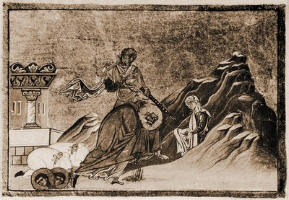
The Works Of Dionysius The Areopagite Volumes 1 & 2
SECTION IV
It is, then, possible to frame in one’s mind good contemplations from everything, and to depict, from things material, the aforesaid dissimilar similitudes, both for the intelligible and the intelligent; since the intelligent hold in a different fashion things which are attributed to things sensible differently. For instance, appetite, in the irrational creatures, takes its rise in the passions, and their movement, which takes the form of appetite, is full of all kinds of unreasonableness. But with regard to the intelligent, we must think of the appetite in another fashion, as denoting, according to my judgment, their manly style, and their determined persistence in their Godlike and unchangeable steadfastness. In like manner we say, with regard to the irrational creatures, that lust is a certain uncircumspect and earthly passionate attachment, arising incontinently from an innate movement, or intimacy in things subject to change, and the irrational supremacy of the bodily desire, which drives the whole organism towards the object of sensual inclination. But when we attribute “lust” to spiritual beings, by clothing them with dissimilar similitudes, we must think that it is a Divine love of the immaterial, above expression and thought, and the inflexible and determined longing for the supernally pure and passionless contemplation, and for the really perpetual and intelligible fellowship in that pure and most exalted splendour, and in the abiding and beautifying comeliness. And ‘incontinence’ we may take for the persistent and inflexible, which nothing can repulse, on account of the pure and changeless love for the Divine beauty, and the whole tendency towards the really desired. But with regard to the irrational living beings, or soulless matter, we appropriately call their irrationality and want of sensible perception a deprivation of reason and sensible perception. And with regard to the immaterial and intelligent beings, we reverently acknowledge their superiority, as supermundane beings, over our discursive and bodily reason, and the material perception of the senses which is alien to the incorporeal Minds. It is, then, permissible to depict forms, which are not discordant, to the celestial beings, even from portions of matter which are the least honourable, since even it, having had its beginning from the Essentially Beautiful, has throughout the whole range of matter some echoes of the intellectual comeliness; and it is possible through these to be led to the immaterial archetypes—things most similar being taken, as has been said, dissimilarly, and the identities being defined, not in the same way, but harmoniously, and appropriately, as regards the intellectual and sensible beings.

 Keep Site Running
Keep Site Running